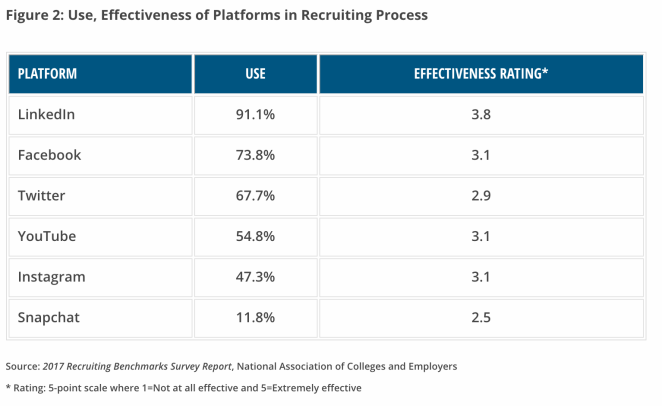Introduction and Overview
At the forefront of recruitment is the attempt to conduct a process with individuals that is frictionless and smooth. From the initial encounter, the pre-hire journey “…needs to be personalised and candidate centric, built on authenticity, reinforced through honest relationships” (Idibu 2016, p.1). Social media platforms, specifically LinkedIn and Facebook, are playing an imperative role in “…human resource (HR) management in general and employee hiring in particular” (Landers & Schmidt 2016, p. 2). As a result, the notion of ‘e-recruitment’, has become increasingly pervasive.

E-recruitment, according to Galanki (2002), is the practice of advertising job vacancies and attracting and assessing prospective applicants online. With the penetration of social media platforms, one can predict that the future of recruitment, for those entering into the white collar-industry, will focus on “reputational capital”, whereby online image is open to inspection (Petre et al. 2017). The white-collar industry consists of employees who perform professional, managerial or administrative positions and whose work is knowledge intensive (Mbaskool n.d.).
Due to the internet’s unrivalled communication abilities, HR recruiters are becoming savvy with the media they use to carefully select and administer job applicants. This in itself raises omnipresent moral, ethical and social concerns for recruiters selecting future university graduates based on LinkedIn and Facebook.
NACE’S 2017 Recruiting Benchmarks Survey, is a clear example of the significance of this topic, which is not only confined to the U.S. With 80% of U.S employers using social media in their recruiting efforts, understanding how prospective employees can be vigilant with their privacy and content online, is also of key concern (NACE 2018).
The following infographic highlights the impact social media platforms have on recruitment (CIPHR 2011)
According to previous literature, the advantages of using social media platforms as part of primary assessment include, cost and time savings, the facilitation of easier access to Generation Y candidates and the ability to attract fresh talent (EDUCBA 2019). On the contrary, common disadvantages of this practice range from, moral concerns around internet privacy, social and ethical concerns regarding discrimination and the hiring of poor-quality applicants as a result of inaccurate and unreliable information (Segal n.d.). From a prospective employee viewpoint, Petre et al. (2017, p. 12), concludes that young people “…have a preference for interactive and engaging methods of communications, and social media websites meet these criteria”. Therefore, the use of these platforms as career tools are extremely relevant as they become common practice for both graduates and HR recruiters.
I believe further clarity and investigation into understanding how Australian HR recruiters assess future graduates’ online profiles is required. I am curious to find out whether cost and time savings override an employer’s decision to hire based on what is moral, social and ethical. If these platforms are considered an effective means, do they still promote equitable and non-biased hiring?. Equitable referring to recruitment practices that promote diversity, inclusion and accessibility for all (Public Service Commission NSW Government 2019). This notion will be reviewed through primary research methods.
On a micro level, this project will aim to provide future marketing graduates with a set of suggestions and recommendations on how to enhance their self-presentation online across LinkedIn and Facebook. This project will explore differing perspectives between HR consultants regarding their use of media platforms within e-recruitment and explore potential developments for future practice.
It is through this approach that I plan to discuss the following with respect to both parties;
“Are LinkedIn and Facebook profiles an effective and equitable means for HR recruiters to evaluate future university graduates on?”

